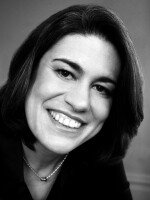It's open mic night at the Bazaar Cafe in San Francisco. A musician who calls himself Porter steps up with a guitar and harmonica strapped around his neck. The small cafe is packed, though it's mostly packed with other singer-songwriters.
Porter is 27, and he's making his first album at a local studio, even though he doesn't have a recording contract.
"The indie music scene has gone beyond record labels now," Porter says. "We don't need Sony giving us $200 million to make an album. We can cut an album fairly cheaply and the quality's still there, and you can play in so many places online. You can get online like CD Baby and all that, and you're distributing to all those places. You don't need a label anymore."
Porter is also signed up with ASCAP — that's one of the major organizations that collects royalties for songwriters. They keep track of when songs are played on the radio, in clubs and online, then divvy up the royalties. He might even collect a few cents for NPR airplay. Artists used to wait until they had a recording contract to sign up with ASCAP, but not anymore.
"Performance of that music has never been greater," says Phil Crosland, vice-president of marketing at ASCAP. "It's just being used in more ways and more places than ever before. Mobile devices — certainly radio, television, video games — are going through the roof in terms of music use."
New Ways To Get By
Membership is soaring in ASCAP and BMI, the two biggest performing rights organizations. Over the last decade, ASCAP membership has quadrupled. One of its 375,000 members is Jess Furman. Furman says she doesn't think she'll make her money selling CDs. After all, record sales are down by half over the last decade.
"If you're an artist, you're trying to make money," Furman says. "The best thing would be getting your song on a TV show or getting it in a film. You get paid residuals for whenever that airs. So I think that artists now — you're looking at all those multiple income streams because the sales have kind of dried up."
So far, Furman hasn't seen much money from ASCAP. She made between $500 and $800 after a short snippet of one of her songs played on MTV in Europe and Latin America — not exactly a living. And without a label, Furman says she has to keep track of her own music, fill out forms and alert ASCAP about where it plays. A lot of independent musicians find that, without a label, they are their own bookkeepers, publicists, designers and bookers.
"And what started out as this enthusiasm started to lead to this kind of slumped-shoulders feeling of, like, 'Uh, yeah. I can do it all myself. Great. Now that means I have to,' " says Derek Sivers, who in 1997 founded CD Baby, one of the first online outlets for unsigned musicians.
Ponying Up Royalties
There is also an imprecise side of how ASCAP does its work. The owner of the Bazaar Cafe has put a large sign on the wall, easily seen from the audience as the musicians perform. It reads, "ASCAP and BMI want my dough. If you play covers, out you go."
Owner Les Wisner says he doesn't want to pay royalty fees because he doesn't trust that ASCAP can keep track of what gets played in his cafe.
But dreams of being a successful musician never die. Musician Alex Stein says he's hopeful he'll see royalties someday, but he's not holding his breath.
ASCAP says that even though the royalty pool is growing, 20 percent of its members get 80 percent of the money.
Copyright 2022 NPR. To see more, visit https://www.npr.org. 9(MDAzMjM2NDYzMDEyMzc1Njk5NjAxNzY3OQ001))






